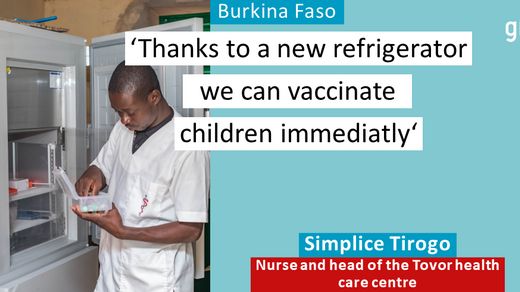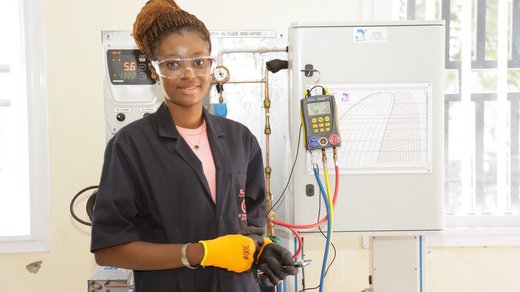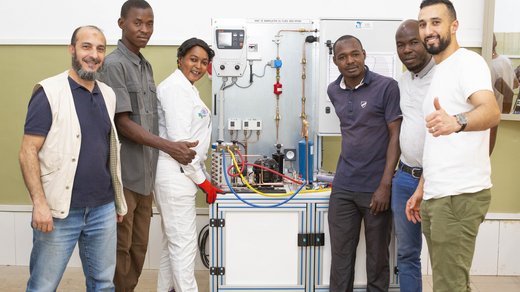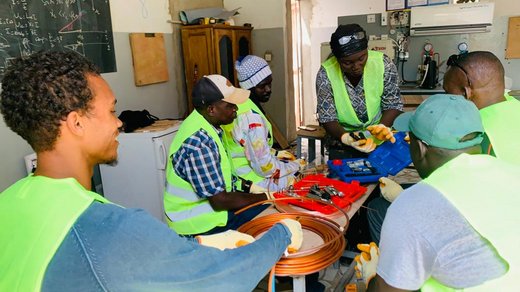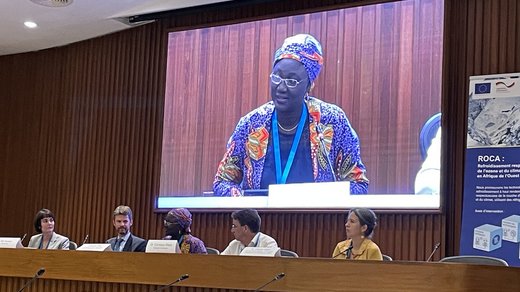Ozone and Climate Friendly Cooling in West and Central Africa (ROCA)
The ROCA project promotes ozone- and climate-friendly cooling technologies in the four African countries Burkina Faso, Cameroon, Mali and Senegal. It started in April 2021 and will run until March 2025.
Map with partner countries
Partner Countries
RAC appliances are spreading rapidly across Africa, particularly in the cities. In rural areas, on the other hand, there is still a lack of refrigeration equipment for agriculture and medical care. The rising number of RAC will contribute to increased energy needs as well as the use of refrigerant gases, many of which are highly damaging to the ozone layer and the global climate. To limit this dual impact, it is necessary to introduce a wide range of ozone- and climate-friendly cooling solutions.
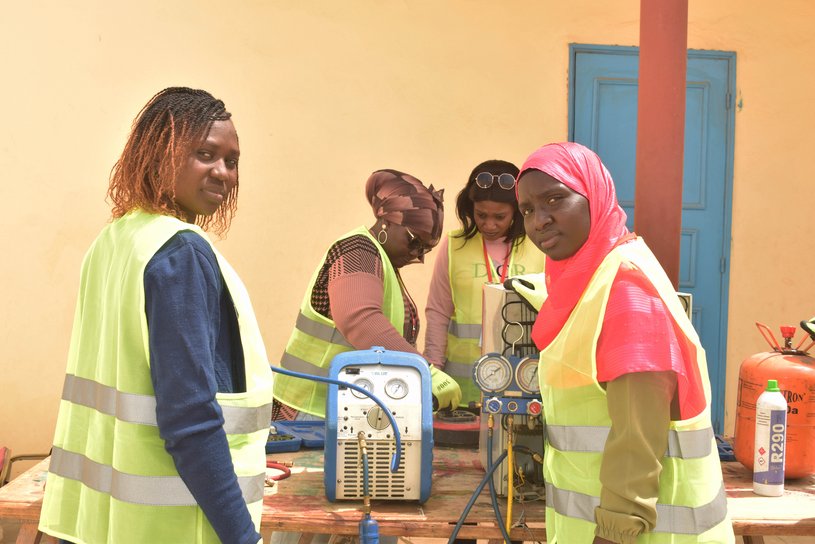
Text
ROCA (Refroidissement respectueux de l'Ozone et du Climat en Afrique de l'Ouest et Centrale) contributes to an increasing use of Green Cooling technologies through improving the policy and regulatory framework on the one hand and building capacity for the use of such technologies on the other.
ROCA includes the following measures:
- Analysing current and future cooling demands in the partner countries (RAC inventories)
- Advisory services for the governments, based on RAC inventories and assessment of existing policies
- Trainings of RAC technicians on safe handling of natural refrigerants online and in Germany (Cool Trainings) as well as in the partner countries
- regional workshops on climate finance and business models to promote the accelerated adoption of ozone- and climate-friendly as well as energy-efficient appliances using natural refrigerants
- Pilot projects using Green Cooling technologies; e.g.
- Air Conditioning: R290-ACs for public buildings
- Food Security:
- cold rooms for agricultural cooperatives in Mali and Senegal;
- an ice machine for a fishermen's cooperative in Senegal
- a cold chain between the slaughterhouse and the market in Ouagadougou, Burkina Faso
- Good Health: cooling for vaccines in Burkina Faso and for a hospital in Cameroon
The project is co-funded by the European Union and the German Federal Ministry for Economic Cooperation and Development (BMZ).
Proklima Impact Stories
Let us give the word to people in our project countries.
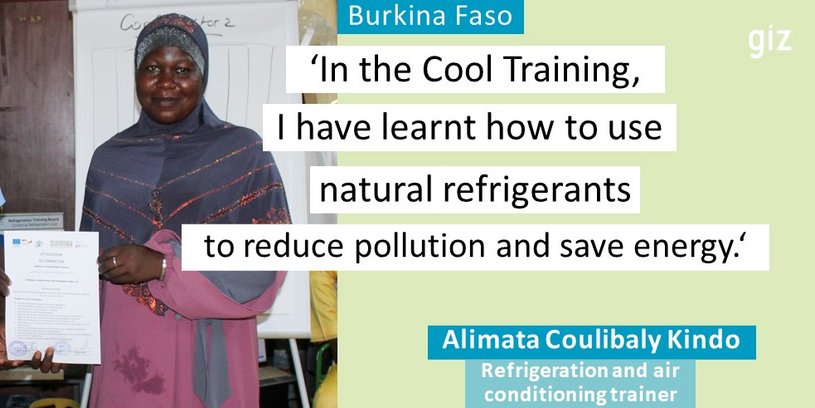
Learn more about Alimata
"As refrigeration technicians, we contribute to environmental pollution and global warming", explains Alimata COULIBALY KINDO, trainer in refrigeration and air conditioning . Her sector is responsible for around 10% of global greenhouse gas emissions. These emissions are caused by the high electricity consumption of the appliances and the high global warming potential of the refrigerants in use. In October 2022, Ms Coulibaly took part in our Cool Training. "In the GIZ Cool Training, I learnt how to use natural refrigerants to reduce pollution and save energy."
One year later, she says that she uses the content of the training in her lessons. She says: "Other generations will come after us. So we are all called upon to protect this planet!"
The project "Climate and Ozone Friendly Cooling in West and Central Africa (ROCA)" has trained more than 150 instructors in its project countries Burkina Faso, Cameroon, Mali and Senegal. In Burkina Faso alone, those trainers have teached over 2 700 students in 2023.
Country: Burkina Faso
Project: ROCA (opens in a new window)
Donors: European Union, German Federal Ministry for Economic Cooperation and Development
Listen to Alimata and other Cool Training participants who explain the advantages of natural refrigerants:
This video is being blocked because of your cookie settings.
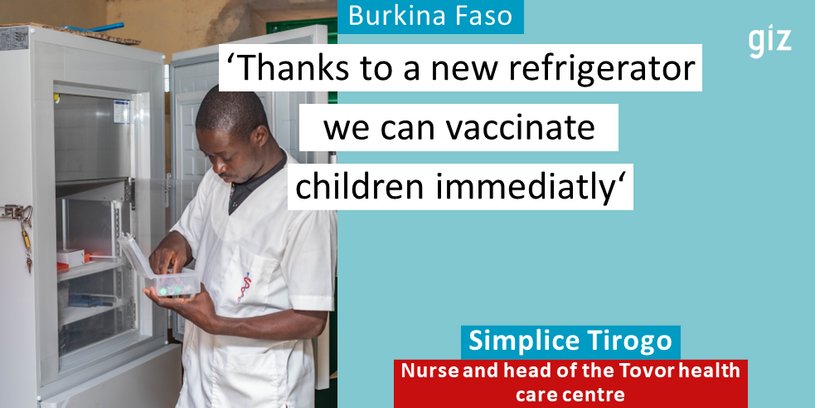
Learn more about Simplice
Simplice Tirogo is a nurse and head of the centre for health care and social support in Tovor, Burkina Faso. The project 'Ozone and Climate Friendly Cooling in West and Central Africa (ROCA)' supported his health care centre with a vaccine refrigerator in 2023. "Our refrigerator was broken since 2020, so the vaccines had to be stored in a neighbouring village. Each time, we had to travel 15 km to bring back the vaccines in a transport box that lasted cold during only a day or two. That means, the cold chain was not sufficient and many vaccines spoiled", explains Simplice Tirogo. "Since we received the refrigerator, we can store the vaccines and keep them fresh on site. We can now instantly immunise the pregnant women and the children who come here and whose vaccinations had to be postponed before. This is very satisfying. I thank all partners who made this possible."
During the first year after the acquisition, 11 000 persons profited from vaccinations in Tovor and in nine other newly equipped health care centres. The new refrigerators are even more climate-friendly than the previous ones: they are very energy-efficient and run on the natural refrigerant isobutane (R600a). The necessary electricity comes from solar panels.
Country: Burkina Faso
Project: ROCA (opens in a new window)
Donors: European Union, German Federal Ministry for Economic Cooperation and Development
More stories coming soon...

